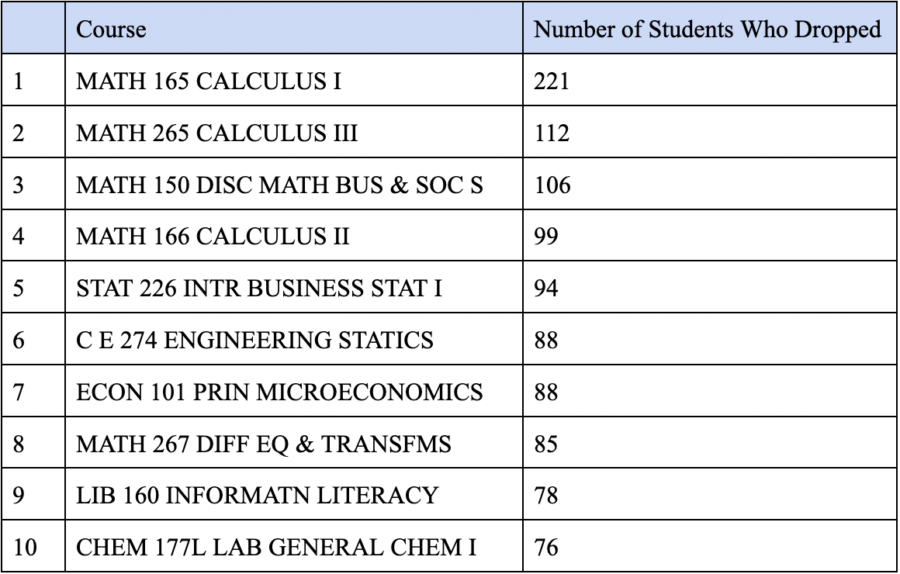The top 10 most dropped courses this semester
The top ten most-dropped courses at Iowa State are ordered according to number of students who dropped.
December 15, 2021
Data from the Iowa State University Office of Enrollment Research and Analytics reveals that the most dropped courses of the 2021 fall semester are predominantly math related.
With a total of 221 drops, MATH 165 (Calculus I) was the highest dropped course overall. This was followed by MATH 265 (Calculus III) and MATH 150 (Discrete Mathematics for Business and Social Sciences), with student drop totals of 112 and 106.
Of the 10 most dropped courses, eight are math, or include advanced math, which falls in line with a larger trend within higher education.
“Nationally, they often talk about what’s called the DFW rate, which is the rate students earn a D, an F or they withdraw from the course,” said Heather Bolles, Iowa State University’s calculus coordinator and a teaching professor in the mathematics department. “[For math] it’s usually anywhere between 25 and 40 percent for most institutions.”
Using initial enrollment numbers and the number of students who dropped, the estimated drop rates for Calculus I and Calculus III in ISU’s 2021 fall semester are 17.4% and 15.6%. Using day 10 enrollment numbers, the estimated drop rate for Discrete Mathematics for Business and Social Sciences is 9.8%.
One of the factors that contributes to these higher drop numbers is math’s role as a prerequisite for several other courses.
“Changing majors and dropping courses can occur in tandem,” said Ann Marie VanDerZanden, Iowa State University’s associate provost for academic programs. “An engineering student who changes their major to supply chain management, which does not require calculus, may choose to drop that course and take MATH 150 or 151, which are required in the supply chain major.”
Another important factor is that math is often a difficult subject for students. For some, this is due to a lack of understanding of previous fundamental concepts.
“I thought I was prepared for it,” said Meg Sukley, a freshman majoring in civil engineering who dropped Calculus I. “I took pre-calc in high school, and it was easy for me. But then again that was COVID pre-calc, so they cut a lot of our curriculum. Now that I’m taking half a semester of pre-calc here, I’m like man, my high school really taught me nothing.”
For others, math can be a struggle because of the fast paced curriculum. Many math courses cover a large number of topics, which decreases the amount of time that can be spent on each concept.
“These are service courses for the engineering and sciences,” Bolles said. “Different departments need different things and rather than making so many different calculus courses that are targeted towards this major and this major, we want to be able to serve them all. So that means there’s several topics within a single course.”
Asking for help in the classroom is a common apprehension, but if a student finds themselves falling behind in a fast moving class, this task can become even more nerve-wracking.
“It’s very intimidating, because I don’t want my peers to think I’m stupid for asking a question,” Sukley said. “I don’t want the professor to tell me, you know, like, if you’re not understanding this, then maybe you should drop this course.”
In response to these struggles, ISU’s academic colleges and departments have been developing and improving initiatives that provide additional support to students.
“The Provost’s Office has expanded our Early Alert program from four to 40 courses over the past two years,” VanDerZanden said. “Through this effort, faculty in gateway courses contact students who may be struggling early in the semester, and help connect them with academic resources available on campus.”
Though it can oftentimes be intimidating, students are encouraged to reach out to their instructors if they are struggling in a course.
“We as instructors really do want to see our students succeed,” Bolles said. “I recognize that they may feel more comfortable going to a tutor or more comfortable in other settings, but I really want them to know that we’re here to help them.”







